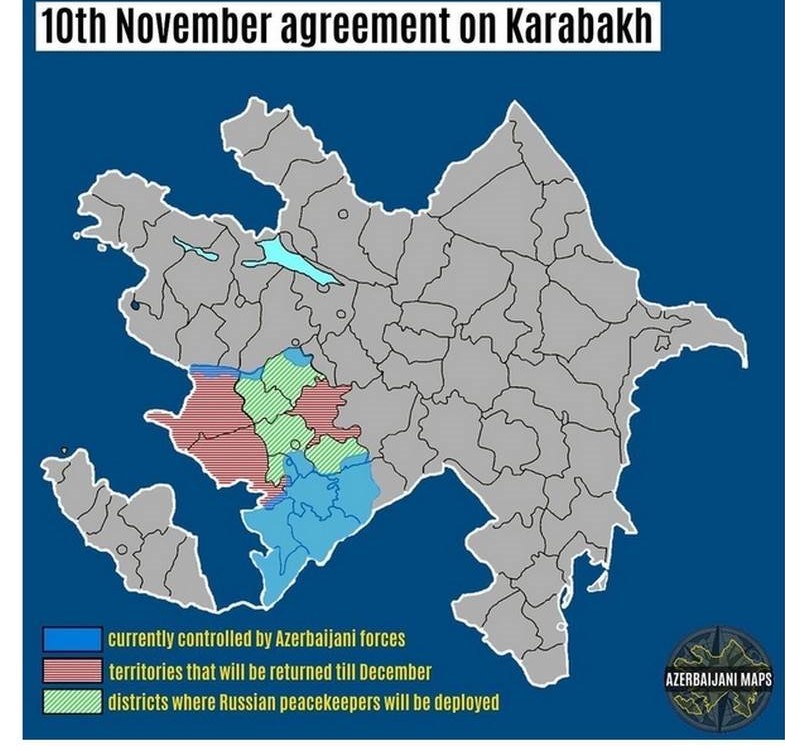The new normalcy, war – it’s quick and efficient

The heavy defeat of Armenia in the war against Azerbaijan is another trait of the new era. When was the last time you heard it said that a country had been severely defeated and capitulated in a war with another country? For decades, the formula “there is no military solution to this conflict, it must be solved using diplomacy” has been chanted for any transnational escalation. It turned out that this was not true. It turned out to be wishful thinking. Let us not use the euphemism - a military solution, but its exact designation - war. It turned out to be quick and efficient.
What has been happening in Nagorno-Karabakh since the end of September would have been an extraordinary event that would not leave the headlines even ten years ago. World leaders would talk tirelessly about it, the media would report on it, and everyone together would look for solutions in Geneva this and Geneva that. Now, in the shadow of the US election and especially Covid-19, the military defeat of Armenia, one of the world's oldest countries, remained on the periphery of the world's attention.
If we have defined the loser of this war - Armenia, then the winners should also be named. Those are Azerbaijan, which is rejoicing openly and proudly, and Turkey, whose authoritarian and ambitious leader, Recep Tayyip Erdoğan, has shown himself to be an effective problem-solver. The open nature of this military conflict (war) fundamentally distinguishes it from the Russia-Ukraine conflict, when Russia pretended not to take part in it and tried to shamefully distance itself from the "victories" in Ilovaisk and Debaltseve. Azerbaijani leader Ilham Aliyev's public mockery of his defeated Armenian political opponent (laughing in front of the camera and asking, "Well, Pashinyan! Well, where is your "status" (meaning Nagorno-Karabakh state status)? Your status has gone to hell. There's no status and will not be.”) is a behavior unprecedented in the modern age. Though there is a reason for this.
Azerbaijan considers this war to be 100% just, and it is difficult to formally disagree with this assessment. After the first Nagorno-Karabakh war in 1992-1994, Armenia took control not only of the historic territories of Nagorno-Karabakh (Artsakh), but also of the large surrounding areas (the so-called buffer zone), which had never counted Armenian historical territories. Azerbaijanis were in fact expelled from these territories, and in Azerbaijan it was perceived as national humiliation. Now is the day of payback. According to the protocols of the agreement of 10 November, all these territories are returned to Azerbaijan. Moreover, Armenia is effectively losing control of historic Nagorno-Karabakh (Artsakh), where Armenians have lived for hundreds of years.
Under the agreement (a detailed description of the terms of the agreement is still being worked out), some 150,000 Armenian-speaking people of Nagorno-Karabakh (Artsakh) will come under the "protection" of 1,960 Russian peacekeepers. The word protection must be put in quotation marks here, because peacekeepers are without heavy armaments, artillery and heavy equipment. It is a symbolic defense based on state (Russian) authority rather than military force.
The outcome of this war is undoubtedly Turkey's triumph, which shows the balance of power not only in the region but also in Europe (not to mention the world). If ten or twenty years ago Turkey humbly knocked on the door of the EU and tried to coordinate pre-accession "homework" with Brussels, now the Turkish leader says French (!) President Emmanuel Macron needs to go to a psychiatrist (!). Europe has shown in this war that it has become powerless, inert and that other more energetic forces no longer even take it into consideration.
But what does Russia look like in this whole mess? Although I have not looked at Russian propaganda channels for a long time, even for work purposes, because everything that is shown there (I emphasize, everything, without exception) is from a parallel reality, I have no doubt that this agreement is presented there as a "routine" triumph of Putin's foreign policy. Which, of course, is true only in this parallel reality. Yes, Putin has punished Armenian Prime Minister Pashinyan for daring to take power not with his, that is, the Kremlin's blessing, but with his own people’s blessing. For such heresy, both the perpetrator and the guilty nation had to be severely punished so that others would know their place. It has been done, but that is also Putin's only benefit from this.
The former vassal of Russia, Azerbaijan, has found another, much closer (both geographically and religiously mentally) "friend and defender" - Turkey. Russia has demonstrated the value of its "defense" not only to Armenia but also to other potential "allies" and, most importantly, has allowed Turkey to shamelessly put its foot in the back door of the Transcaucasia. Given its geographical specificities, it will be increasingly difficult for Russia to imagine that the Transcaucasia is still in its "sphere of influence", as Turkey is right then and there with Azerbaijan, while Russia is far behind the mountains, and its military capabilities are in doubt.
Nor can it be said that Russia has saved Armenia from complete military destruction and the fall of Stepanakert, the capital of self-proclaimed Nagorno-Karabakh (Artsakh). It was probably not in Azerbaijan/Turkey's plans to take responsibility for the fate of 150,000 people and a possible humanitarian catastrophe. The result is optimal before taking the next steps. Given Erdoğan's desire to pretend to be the main "defender" of the world's Muslim ummah, these steps will not be pleasant for Armenians or other Christians. Both in Russia and elsewhere in the world.